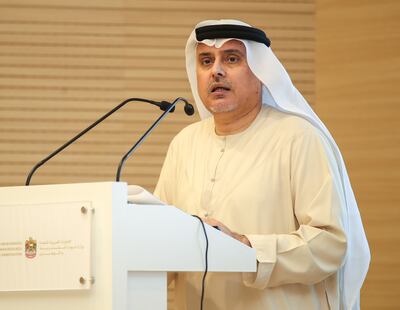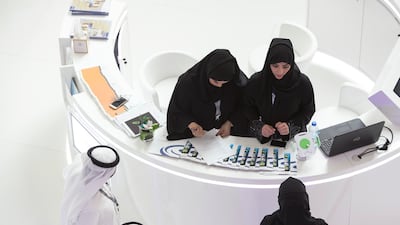Two million workers have signed up for the UAE's unemployment insurance scheme since it was introduced at the start of the year, a minister said on Tuesday.
Abdulrahman Al Awar, Minister of Human Resources and Emiratisation, said 40,000 of those already enrolled were Emirati.
He delivered an update on the progress of the nationwide initiative during a meeting of the Federal National Council in Abu Dhabi.
He also briefed council members on the progress of the country's private sector Emiratisation drive.

The minister said the number of Emiratis working in the private sector had reached 66,000, with more than 10,000 hired in the first three months of this year.
He said the encouraging figures underscored the ministry's commitment to bolstering the private-sector Emirati workforce.
Companies with more than 50 employees were required to ensure that 2 per cent of their workforce was Emirati by January 1. Firms in free zones were exempt.
Employers must hit a target of 4 per cent by January 1, 2024, rising to 10 per cent by the end of 2026.
Unemployment plan offers protection
The unemployment scheme aims to provide a safety net to people in both the public and private sectors when they lose their jobs.
The social security support programme, announced last May, pays Emiratis and residents a cash sum for three months if their job is ended by their employers.
To receive the unemployment financial support, employees must be registered with the scheme and pay an insurance premium based on their monthly salary.
The deadline for registration for the unemployment insurance programme is June 30, the ministry said.
The scheme applies to all workers in the private and federal sector, apart from investors, business owners who own and manage their business themselves, domestic workers, those employed on a temporary basis, those under the age of 18, and retirees who receive a pension and have joined a new employer.
How does the scheme work?
Compensation will be paid for a maximum of three months from the date of an employee’s job loss and will be calculated at 60 per cent of their basic salary for a maximum payment of Dh20,000 ($5,445) per month, according to the ministry.
The cost of the insurance programme is divided into two categories.
The first category covers employees who earn a basic salary of Dh16,000 or less per month. The second category is for workers who earn a monthly basic salary of Dh16,000 or more.
The insurance cost for employees earning a basic salary of Dh16,000 or less has been set at Dh5 per month, or Dh60 annually.
Workers who earn a monthly basic salary of Dh16,000 or more will pay Dh10 per month, or Dh120 a year.
Employees will pay for the unemployment insurance themselves. This can be paid either monthly, quarterly, half-yearly, or on an annual basis, the ministry said. The value of the insurance policy is also subject to VAT.
Who is eligible for the scheme?
Employees are eligible for the jobless payment if they have worked and subscribed for at least 12 months to the insurance programme, as long as they have not been dismissed for disciplinary reasons or because they resigned.
Employees who work on a commission basis may also subscribe to the scheme.
However, insured employees are not eligible for the payment if they have left the country or have started a new job.
How do I subscribe?
All eligible employees must subscribe to the new social security support programme by June 30.
The insurance pool, which is represented by Dubai Insurance, is responsible for providing the service.
Employees can subscribe to the insurance programme in a number of ways, including through the insurance pool’s website and its smart application, or via bank ATMs, kiosk machines, business service centres, money exchange companies, du and Etisalat, or by SMS, the ministry said.
The ministry said it may also announce at a later date other channels that will allow employees to sign up for the unemployment insurance scheme.


